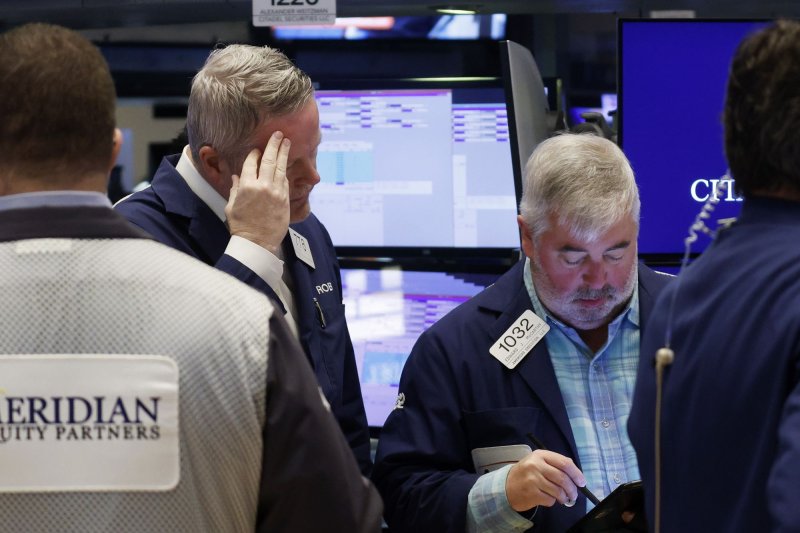April 4 (UPI) — The stock market ended a turbulent week with huge declines Friday with the Nasdaq Composite entering a bear market amid fallout from President Donald Trump‘s new tariffs on most nations worldwide.
U.S. markets plummeted for the second consecutive day as investors reacted to Trump’s “Liberation Day” tariffs announced Wednesday.
The Dow Jones Industrial Average declined 2,2331.07, or 5.5%, to 38,314.86, the worst setback since the Covid-19 pandemic in March 2020 and the lowest for the average since May 30, 2024. The average was last under 40,000 on Aug. 13.
On Thursday, DJIA dropped 1,679. It hit 45,014 on Dec 4, so it is 14.9% down since then.
The Standard & Poor’s 500 had a worse decline, 5.97%, or 322.44, which also was its biggest decline since the pandemic. The index is now at 5,074.08 and off 17% from 6,144.15 on Feb. 19. Only 14 companies were up Friday.
The tech-heavy Nasdaq Composite slumped 5.82%, or 962.82 points, to fall to 15,587.79. The index is down 22% and is in a bear market for the first time since 2022. A bear market is considered to be a 20% decline with 10% a correction.
The 10-year Treasury yield was at 4% Friday, a drop of 0.055%, as investors made safety grabs of bonds, which lowered rates and lifted prices.
West Texas Intermediate Crude for May dropped $4.63 to $62.32 a barrel, reflecting energy traders’ concerns fuel demand will decline.
And gold was trading at $3,056.10, a decline of $65.60, as investors look to metals amid uncertainty about tariffs and the economy. The record was 3,166 on Wednesday.
“Markets may actually be underreacting, especially if these rates turn out to be final, given the potential knock-on effects to global consumption and trade,” Matt, Burdett, the head of the equities at Thornburg Investment Management, told CNN. “The tariffs have injected a feel of uncertainty and volatility we haven’t seen since the early days of the pandemic.”
Keith Lerner, co-chief investment officer at Truist, told CNBC: “They’re getting hit because the economy is softening. On the other side, they’re still paying high levels of interest payments on debt because they have more of this floating-rate debt.
“They’re getting squeezed on both sides.”
Overseas, exchanges were also down as China’s commerce ministry announced Friday it will put a 34% tariff on all U.S. products, which matches the tariffs Trump put on China on Wednesday. The Asian nation was hit with a 20% tariff so the total is 54%.
China’s attempts to answer Trump’s tariffs went past just reciprocity as it added several companies to its “unreliable entities list” of people, companies and organizations it deems have violated market rules or commitments. It further opened an investigation into DuPont, which felt the pinch as its shares dropped 12.75%.
Other economic developments
On Friday, Federal Reserve Chairman Jerome Powell warned that Trump’s strict tariffs will worsen inflation and lower economic growth. As a result, the Fed won’t change interest rates until the full economic effect is clarified.
The Federal Reserve next meets in June.
The CME FedWatch Tool reports traders are pricing in more than a 71% chance of four quarter percentage point by year-end.
JPMorgan raised the odds of a recession this year to 60% from 40% Thursday, which followed the worst day on the stock market since 2020.
The markets continued to decline despite the Bureau of Labor Statistics reporting just before the opening bell that non-farm payrolls expanded by 228,000 in March, which was above forecast, but the unemployment rate also ticked up to 4.2%.
Market sectors
The stock price of Apple, which makes computers and cellphones in China, fell 7.29%.
Nike, though it depends on international supply chains and imports from Vietnam, was up 3%.
Auto stocks also dropped as 46% of cars sold in the United States come from other nations.
Tesla, which makes most of its cars in the United States but imports parts, was down 10.42% to 239.43. It was more than double that amount on Dec. 17 with a record 479.86.
Ford, which makes fewer cars outside the U.S. than other major companies, rose 0.42%.
On Thursday, the company said consumers will get employee pricing through June 2. A 30-second ad will be aired during the men’s NCAA Final Four. It is also available on YouTube.
General Motors was down 3.75% and Stellantis 4.80%.
Stellantis, the parent company of Chrysler and Dodge, also owns foreign brands like Jeep, Ram, Alfa Romeo, Fiat, and Maserati.
